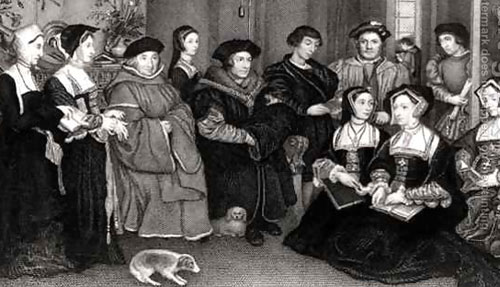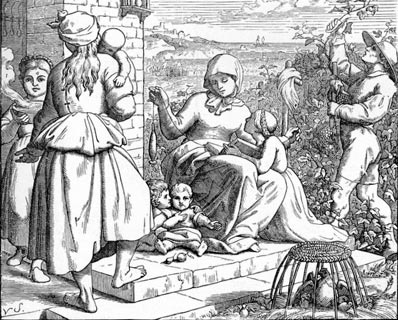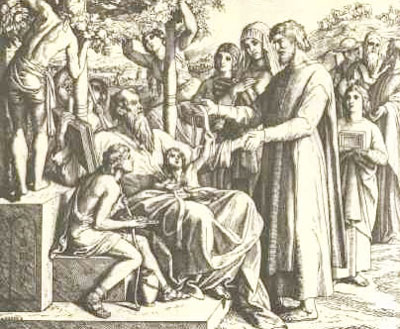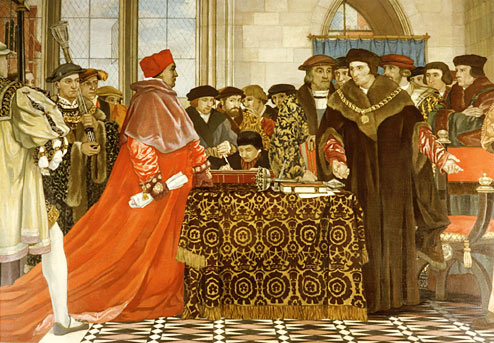May 2012 - Vol. 60
Training
in Excellence
The true measure
of a man
More was regarded by his own peers as an exemplary judge beyond reproach. It was common for people with civil complaints to wait many years before their case would be heard in court. More was noted for his impartiality and speed in seeing that cases were heard in a timely fashion. He earned the singular achievement of finishing all of the backlog of court cases during his tenure as judge. More’s reputation as a man of moral integrity and his defence of conscience, have inspired succeeding generations to the present. Samuel Johnson, one of the most famous English literary figures of the 18th century, wrote of More, “He was the person of the greatest virtue these islands ever produced.” More’s zeal for justice was fuelled by his moral vision and courage to live according to the convictions of his faith and in obedience to God’s law. He strove to put the love of God first and to allow nothing to keep him from that love. He wrote, “Let every man in time learn, as we should, to love God above all other things, and to love all other things for his sake. And whatever love is not based on that purpose – namely, the pleasure of God – it is a very vain and an unfruitful love. And whatever love we bear to any creature in such a way that we love God the less, that love is loathsome love and hinders us from heaven. Love no child of your own so tenderly that you could not be content to sacrifice him to God as Abraham was ready to do with Isaac, if God were to command you to do so. And since we know that God would never do that, offer your child otherwise to God’s service.”One day, while travelling on business, he received news from his distraught wife that his barns had burned to the ground. He wrote back, “Be of good cheer, and take all the household with you to church, where you should thank God – both for what he has given us and with what he has left us…I pray you, with the children and with all the household, be merry in God.”  Thomas More (center), with his father (left) and More's family, from an etching based on Holbein's painting The true measure of a man or woman is proved in the crucible of trial and suffering. Who do we love most, and what are we willing to sacrifice and die for? There are many notable examples of godly men and women, married and single, young and old, who chose the higher way of excellence rather than mediocrity, chose integrity rather than compromise, sacrifice rather than personal gain, and forgiveness rather than retribution. May we follow their example and strive to model for others – especially our children and the generations to come – the way of true greatness. Training by example
Jesus warned that teachers must set a good example and do what they tell others to do. “The scribes and the Pharisees speak with the authority of Moses…But you must not imitate their lives! For they preach but do not practice” (Matthew 23:3). Palladius (365-425 AD), a monk of Egypt and later a bishop of Helenopolis, explained how Jesus taught by example to form his disciples in godly character. Words and syllables do not constitute teaching – sometimes those who speak are disreputable in the extreme. Teaching consists of virtuous acts of conduct, and not being bad tempered or causing harm…This is how Jesus taught....He did not use fine language when teaching others – he required the formation of their character [quote from the Lausiac History].Role models Paul the Apostle knew the importance of good Christian role models in promoting Christian virtue and living a holy life. He taught by example and showed others the way to live as disciples of Christ. “Imitate me as I imitate Christ” (1 Corinthians 11:1). People learn more about a life of character from what they see than from what they hear. Children instinctively imitate grown-ups – for better or for worse. Growth in good character requires the right kinds of models as well as the right kind of intellectual formation. But the upholding of godly models of virtue and the training of young people in Christian character are rarely promoted today. The moral virtues are often ridiculed, ignored, or rendered meaningless in modern culture. Platitudes, such as “be true to yourself,” replace virtues of loyalty, respect, and commitment in relationships, and the integrity of keeping one’s word. We live in a character deficient society because its moral bearings have been lost or ridiculed as outdated and unnecessary. The most prominent role models held up by the media are the celebrities from the film, music, and sports industries. Unfortunately, nearly all of them fail as good role models. We need to fill the vacuum and show young people how to find and imitate the right role models who will teach and inspire them to choose not only what is good and healthy – but what is excellent. Parents, teachers, and leaders are role models – whether they recognize it or not. People instinctively observe how leaders act and behave. Good leaders can counteract the example of bad role models in society by engaging personally with the people they are serving. They can help others learn how to grow in wisdom and other good character traits. The Lord also works to instruct us through the godly examples of men and women in the Bible and in Christian history – as well as living examples in our own communities and churches. Biblical role
models

The Virtuous Woman from the Book of Proverbs, Chapter 31:10-31 A good wife who can find? She is far more precious than jewels. The heart of her husband trusts in her, and he will have no lack of gain. She does him good, and not harm, all the days of her life. She seeks wool and flax, and works with willing hands. She is like the ships of the merchant, she brings her food from afar. She rises while it is yet night and provides food for her household and tasks for her maidens. She considers a field and buys it; with the fruit of her hands she plants a vineyard. She girds her loins with strength and makes her arms strong. She perceives that her merchandise is profitable. Her lamp does not go out at night. She puts her hands to the distaff, and her hands hold the spindle. She opens her hand to the poor, and reaches out her hands to the needy. She is not afraid of snow for her household, for all her household are clothed in scarlet. She makes herself coverings; her clothing is fine linen and purple. Her husband is known in the gates, when he sits among the elders of the land. She makes linen garments and sells them; she delivers girdles to the merchant. Strength and dignity are her clothing, and she laughs at the time to come. She opens her mouth with wisdom, and the teaching of kindness is on her tongue. She looks well to the ways of her household, and does not eat the bread of idleness. Her children rise up and call her blessed; her husband also, and he praises her: "Many women have done excellently, but you surpass them all." Charm is deceitful, and beauty is vain, but a woman who fears the LORD is to be praised. Give her of the fruit of her hands, and let her works praise her in the gates. 
The Virtuous Man from the Book of Job, Chapter 29:1-15 And Job again took up his discourse, and said: "Oh, that I were as in the months of old, as in the days when God watched over me; when his lamp shone upon my head, and by his light I walked through darkness; as I was in my autumn days, when the friendship of God was upon my tent; when the Almighty was yet with me, when my children were about me; when my steps were washed with milk, and the rock poured out for me streams of oil! When I went out to the gate of the city, when I prepared my seat in the square, the young men saw me and withdrew, and the aged rose and stood; the princes refrained from talking, and laid their hand on their mouth; the voice of the nobles was hushed, and their tongue cleaved to the roof of their mouth. When the ear heard, it called me blessed, and when the eye saw, it approved; because I delivered the poor who cried, and the fatherless who had none to help him. The blessing of him who was about to perish came upon me, and I caused the widow's heart to sing for joy. I put on righteousness, and it clothed me; my justice was like a robe and a turban. I was eyes to the blind, and feet to the lame.I was a father to the poor, and I searched out the cause of him whom I did not know. I broke the fangs of the unrighteous, and made him drop his prey from his teeth. Then I thought, `I shall die in my nest, and I shall multiply my days as the sand, my roots spread out to the waters, with the dew all night on my branches, my glory fresh with me, and my bow ever new in my hand.' "Men listened to me, and waited, and kept silence for my counsel. After I spoke they did not speak again, and my word dropped upon them. They waited for me as for the rain; and they opened their mouths as for the spring rain. I smiled on them when they had no confidence; and the light of my countenance they did not cast down. I chose their way, and sat as chief, and I dwelt like a king among his troops, like one who comforts mourners.Bad character corrupts families and society God not only calls Christian parents, teachers, and leaders to be good role models for their families and communities. They must also do everything they can to root out evil and harmful influences that weaken a holy way of living. Scripture warns that if bad behavior and vice are left unchecked, these evil influences will not only affect those who are young and vulnerable, but they will also have a corrupting affect on family life and society as a whole. God holds teachers and leaders doubly responsible because of their influence on others. That is why Jesus had very strong words of warning for the religious and secular authorities in Palestine – “beware of the leaven of the Pharisees and the leaven of Herod” (Mark 8:15). Left over leaven (old leaven no longer useful or good for new dough) was often used as a symbol in the Scriptures for evil behavior that had a corrupting affect on others. Paul the Apostle used the image of old leaven when speaking to the Christians of Corinth about their tolerance of sinful behavior in their own community. Your boasting is not good. Do you not know that a little leaven leavens the whole lump? Cleanse out the old leaven....the leaven of malice and evil, with the unleavened bread of sincerity and truth (1 Corinthians 5:6-8).The Lord rebuked the prophet Eli because he did not discipline his own sons when they openly broke God's commandments and flouted his commands in the holy place that was set apart for the worship of God (1 Samuel 2:12-17, 22-25, 27-36). The challenge for Christian parents, teachers, and leaders today is daunting. Bad examples, lax moral standards, and the growing influence of immoral media channels have leavened not only many secular societies, but many Christian homes and communities as well. We are fortunately not left alone in our struggle to build a Christian society that upholds God's law and way of life. The Lord himself is actively at work to bring moral and spiritual renewal to every family, nation, and community that acknowleges his rule and saving power. God is raising up Christian communities today as bulwarks to stem the tide of evil and to strengthen individuals and families in their call to be saints, and martyrs, and to be missionaries of the good news of his kingdom. [Don Schwager is a member of The Servants of the Word and the author of the Daily Scripture Reading and Meditation website.]. |
. | |
|
publishing address: Park Royal Business Centre, 9-17 Park Royal Road, Suite 108, London NW10 7LQ, United Kingdom email: living.bulwark@yahoo.com |
. |
